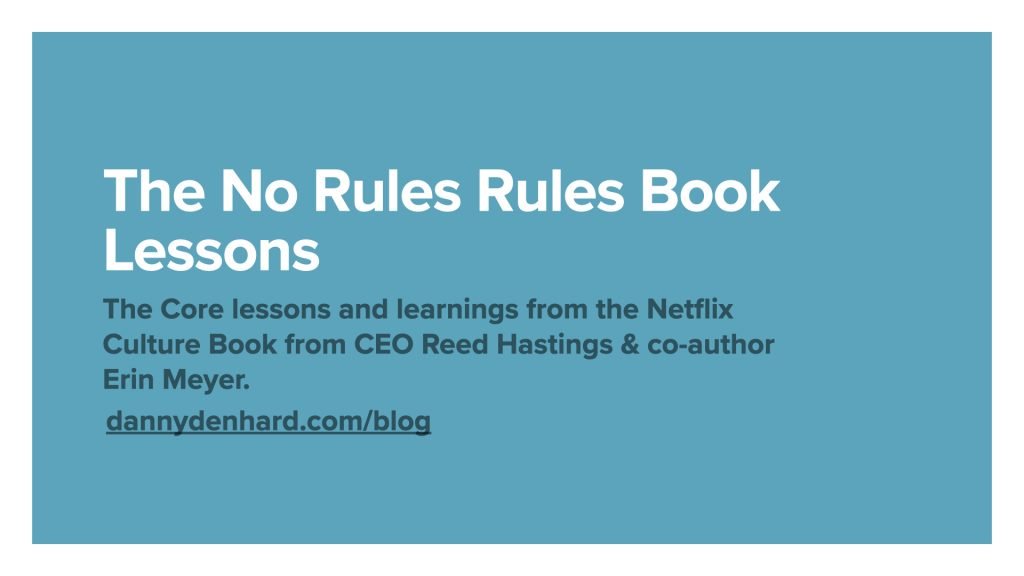Skip to content
The infamous pricing woesThe failure of qwikster The push to make the UI more difficult on gaming platforms Even letting go their culture leader Patty McCord
Netflix was deliberate in creating a “High performing environment”, this took years to set up and was a constant reference throughout the book. It appears it is something Reed himself suggests is one of his dots (dot is the book reference to connecting the dots (important moments) for success) Set up through test and learning – this does not just apply to tech, it applies to people and evolving over time. So many of us believe we do this but many rarely really do have actual test and learn methodology implementedNetflix took years to create, years to evolve, and has taken years to build moats around itself. Many high profile experts suggest Netflix doesn’t have a content or brand moat, I strongly disagree with this and is evident in recent time.A prime example of high performance and long term: When content was being pulled back by other competitors and Disney+ joined the race, Netflix took the long game and went so early they benefitted from this and will continue to do so into 2021 as they film 18 months of content ahead. The power of Netflix is there huge subscriber base, their ability to add into your suggested feed, create word of mouth via average to good content and gain mass viewership to their original content. This content can go international by default, unlike so many other competitors who are restricted by licensing.Netflix seem to be very deliberate in the actions taken and discuss openly for the best of the company, even when they do something wrong the most deliberate step is to critique and send a memo to suggest how to learn and grow from it The Netflix is high performing as they treat everyone as an important part of the company, your opinion is always welcomed especially when reviewing big ideas or concepts. Centralising thoughts and having written discussion is a key differentiator vs chatter on tools like slack and teamsSalaries: Netflix made the decision to pay top of the market for creative roles and encourage managers and hr to understand the market value and provide raises
Reed (CEO) seems close to what is happening without having to be across everything. He advocates trust from top to bottom and bottom to top. If you work there you will be trusted wholeheartedly Reed’s influence is felt, although he appears more available than most CEO’s there appears to be an all-seeing eye. Reed also admits to when people three layers below him call him out on his influence and he admits fault, powerful leadership and trustSet and reinforce context to guide employee behaviour – sounds simple but their processes are important and if something feels broken Netflix appear to reviewAnyone who is running a campaign has to sign it off not your boss – this is something that sounds simple but has many old processes to change. I personally love this, however, it is important to highlight that if you make too many mistakes you will likely be removed from the business, even with hundreds of lessons. Marketing teams will want to read the example of lack of spreading the idea and campaign whilst on holiday and then being promoted a few months later You impress the business, not your boss – this is something that I think many will struggle with when trying to roll out ideas and concepts, rolling this out requires to undo years of conditioning and those political players who won’t be fully invested in making this workNetflix long term vision and ensuring they have the best drives their teams ahead and is clear for everyone to understand Behaviour is modelled and expectations are clearly communicated – again sounds obvious but many businesses believe they do this when they really don’t“Start, Stop, Continue” is a good framing to use with feedback, be wary of ensuring having someone who can take direct feedback and another person who can give direct and honest feedback. Remember Act in Netflix’s best interest.
Socialising the idea and what you are working on has constant mentions throughout the book. With good and bad stories of communication and explaining what you were doing internationally. Yes, this seems like common sense but when you are working heads down it doesn’t always happen and often people don’t listen. For Netflix is it how you learn, communicate those failings, and go again. Farming: Gaining feedback (they call it farming) is essential at Netflix. It’s centralised on written in a document.This is important to note that this is a process from the very top to the very bottom.
Unlimited Vacation had to have clear guidelines. The famous story of finance taking time off at year-end and having a detrimental impact will strike fear into many business and CFO’sMistakes happen, these are learning opportunities, and Netflix employees know to share their memo
Cultivate culture/feedback and candor – open and transparent 360s were mentioned and a number of stories provided in how badly they worked when introduce and were scrapped because candor was so high on the importance and in the moment at Netflix.This is great if people are prepare and comfortable, it seemed to really divide the people. Leadership teams often run this exercise and can be a good exercise, I personally don’t think any important feedback should be a surprise but being able to provide feedback to anyone at any level you work with regularly has many merits In recent interviews and podcasts Reed has broken down culture to be: “Behaviours to get promoted or let go” “What are the behaviour to follow” within your business. As with Focus, I have to agree with the simplified version, I often suggest it is“Culture is the environment you create, how people feel, how they communicate, how they work together, and how they and the company are set up for success.”Reduce controls – but guidance has to be clear. Something I noted a few times were the references to guidance, for me personally this is why I recommend principles when creating culture and providing overviews for cultural development. Talent density is their number one theme (or an important dot – theme in the book) – this was their core pillar to having high performance and gaining high An important sentence that rang true – “When I saw how senior management spends their time. I lost confidence in the company”. This really stood out for me and so much so I spoke to a number of previous leadership team colleagues and friends in leadership positions.
Reed Hastings with Freakonomics on their book club podcast –5-minute video podcast
Share
Explore

 The Netflix culture book as many people is pitching it is a great read and good insight into a company that clearly thrives from high performance and understanding their mission of what is good for the consumer is good for Netflix.
The Netflix culture book as many people is pitching it is a great read and good insight into a company that clearly thrives from high performance and understanding their mission of what is good for the consumer is good for Netflix.

The book is filled with antidotes from current employees and ex-staff doing a good job by putting across a balanced side to how Netflix is great for some and not an environment for others. Netflix’s approach to high-performance environment will be too ruthless for so many despite their healthy severance packages.
The No Rules Rules book includes many famous stories we have heard externally told but rarely told by a Netflix leader:
The No Rules Rules book is full of business lessons and learnings, some lessons are brilliant, others are a little unexpected. One or two will open a few eyes to how ruthless some workplaces are and chose to be. I recommend reading this book if you are existing business leaders (even the most senior ELT members), up and coming middle managers, the book will provide important long term lessons for those who might just be prepared to disrupt another industry.
My Key Take-Aways
High Performance
Leadership
Ideas And Ways Of Working
Learning From Mistakes
Culture-Based Takeaways
Making The Necessary Changes To Replicate Netflix?
I would say it’s going to be a huge effort and journey for companies trying to replicate this approach and I can imagine this being the talking point for many leadership teams in the coming months.
The Most Important Take Away
This is not a recruitment tool or subscriber tool for Netflix. In some sections it shows what a rough road and how tough it can be for “average” people who join the streaming giant.
Do You Need To Read The Book?
Erin Meyer is a great co-author and was good to hear a different view or an alternative view throughout the book and pairs well with Reed’s insights and stories.
Act in Netflix’s best interest is something that is going to be an important guide if you are looking to refresh your culture and removing ‘me before the we’, this is going to be tricky however Netflix’s culture has numerous foundational points.
There is no such thing as the perfect company and perfect environment especially as so many companies find out, even those who worked really hard on creating a good workplace or a good environment for good culture to succeed.
Netflix can be used as an important anchor to guide some of your decisions and a foundation to improve your core bass of talent density, improve your feedback loops and develop the most important departments in your business, especially with their ideology on management being different to how so many businesses have been conditioned into.
I highly recommend reading the full book if you are a leader or looking to be a disruptor.
No time to read the whole book?
No Rules Rules Podcasts To Listen To
Want to print your doc?
This is not the way.
This is not the way.

Try clicking the ··· in the right corner or using a keyboard shortcut (
CtrlP
) instead.